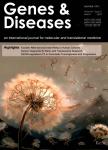Identification of rare PTCH1 nonsense variant causing orofacial cleft in a Chinese family and an up-to-date genotype- phenotype analysis
作者机构:Department of OrthodonticsPeking University School and Hospital of StomatologyBeijing100081PR China Central LaboratoryPeking University School and Hospital of StomatologyBeijing100081PR China Department of StomatologyThe Fifth Affiliated Hospital of Xinjiang Medical UniversityUrumqi830000PR China Xinjiang Medical UniversityUrumqi830000PR China Chongqing Medical UniversityChongqing400016PR China Key Laboratory of Shaanxi Province for Craniofacial Precision Medicine Research Department of OrthodonticsCollege of StomatologyXi’an Jiaotong UniversityXi’an 710004PR China
出 版 物:《Genes & Diseases》 (基因与疾病(英文))
年 卷 期:2021年第8卷第5期
页 面:689-697页
核心收录:
学科分类:0710[理学-生物学] 07[理学] 071007[理学-遗传学]
基 金:This study was supported by the National Natural Science Foundation of China(grant numbers:81870747,81860194,and 31771619) Beijing Municipal Natural Science Foundation(grant number:7182184)
主 题:Cleft lip with or without palate Clinical genetics Genotype-phenotype analysis PTCH1 Whole-exome sequencing
摘 要:The Patched 1(PTCH1)gene encodes a membrane receptor involved in the Hedge-hog(Hh)signaling pathway,an abnormal state of which may result in congenital defects or hu-man *** this study,we conducted whole-exome sequencing on a three-generation Chinese family characterized with variable penetrance of orofacial clefts.A rare heterozygous variant in the PTCH1 gene(c.2833CT p.R945X)was identified as a disease-associated *** modeling revealed a truncation starting from the middle of the second extracellular domain of PTCH1 *** may damage its ligand recognition and sterol transportation abilities,thereby affecting the Hh signaling *** assays indi-cated that the R945X protein had reduced stability compared to the wild-type in *** addi-tion,we reviewed the locations and mutation types of PTCH1 variants in individuals with clefting phenotypes,and analyzed the associations between clefts and locations or types of variants within *** findings provide further evidence that PTCH1 variants result in or-ofacial clefts,and contributed to genetic counseling and clinical surveillance in this family.



